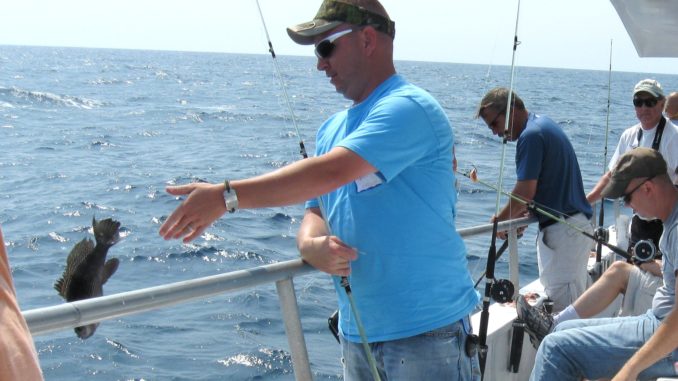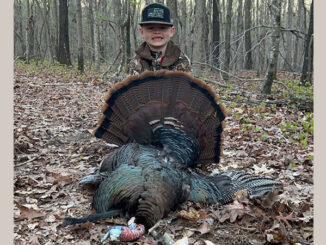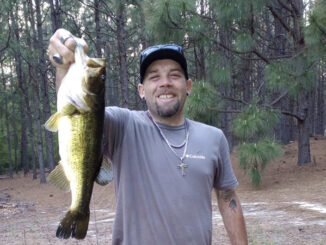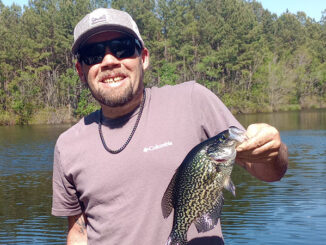
Closure could pummel charter and head boat services.
Recreational fishermen along the south Atlantic Coast weren’t expecting to get in a full year of black sea bass fishing, but when the limit was reduced from 15 to five fish, most thought the season would last more than four or five months.
However, at the recent South Atlantic Fishery Management Council meeting held Sept. 12-16 at Charleston, S.C., a National Marine Fisheries Service spokesman told council members the federal agency anticipated having to close the fishery some time in October.
The 2011-12 black sea bass season opened on June 1. Until June 22, the limit was 15 fish per person, but it was then reduced to five fish per person.
This limit reduction was implemented as a measure to extend the season. While many did not believe the reduced limit would create enough reduction in catch to allow the season to remain open all year, it was expected to last seven to eight months.
An early closure is especially harmful to head-boat and charter-boat operators, since fall is a prime time for offshore bottom fishing and black sea bass are a primary target.
Several charter operators said their customers were already put off by the reduced limit, and they were expecting mass cancellations once the date of the closure was announced.
. “I attended most of the meetings and met with council members,” said Capt. Keith Logan of Feedin’ Frenzy Charters operating in both Carolinas. “They told us that by reducing the limit to five fish, we would get in eight months of fishing before they closed the season. Now they are telling us it will close in five months.”
Closures are a real problem for charters, Logan said.
“I lost 37 charters in April and May before the black sea bass season was opened.” He said. “I’ve got 18 trips booked for October and November, and (any early closure) means I will lose most of them.
“This is a major issue, especially when we are releasing lots of black sea bass and know there are more fish than they say there are.”
Michelle Duval, the new North Carolina Division of Marine Fisheries representative to the SAFMC, sympathizes with Logan.
“I wasn’t on the Council then, but probably would have agreed with the approach they took to ending overfishing and rebuilding the black sea bass stocks,” Duval said. “There are several methods to choose, and the Council chose the constant-catch method.
“Everyone liked this at first because it focused on giving up a little early and then more later in the process of rebuilding the stocks. This allowed keeping a few more fish in the initial years, and the trade-off was waiting later before increasing the limits. Now the fishery is starting to recover and fishermen don’t like having to put back fish they think they should be keeping because the fishery is recovering.”
Duval explained that the black sea bass recreational annual allocation for the four SAFMC states is 409,000 pounds. She pointed out that the 2010-11 catch was 476,253 pounds, so there was an overage of 67,253 pounds that had to be deducted from the 2011-12 allocation.
This overage was approximately 16.5 per cent, and would have allowed another month of fishing.
Duval said she NMFS biologists told her they are waiting on the latest Marine Recreational Fishing Statistical Survey to compile catch numbers and project a date when the fishery has to close.
The expectations are for mid-October.
Duval said she hopes the estimate require no or a minimal overage to pay back in the 2012-2013 season, which would allow that season to remain open longer.
Tom Swatzel of Murrells Inlet, S.C., holds the South Carolina obligatory seat on the SAFMC. In a recent interview, Swatzel said a black sea bass assessment had been done and the draft stock assessment is under review to be presented to the council at their December 5-9 meeting in Raleigh, N.C.
While many fishermen believe the stock assessment will support raising the annual catch limit, Swatzel does not. He is concerned the ACL has been exceeded again, which would reduce the available poundage and shorten the season even more.
Swatzel believes the economic impact of the closed black sea bass season will reach far beyond the charter fishermen and tackle shop operators.
“To possibly have the recreational black sea bass season closed for (seven to eight) months is a huge blow to the coastal economy,” he told the Myrtle Beach Sun News. “It will have a big direct impact on charter and party boat operators, but it will also affect hotels, restaurants, bait and tackle shops, marinas and boat dealers, among others, who economically depend on tourism generated by offshore recreational fishing for sea bass.
“A prolonged closure will be a job killer.”
Another round of public hearings on black sea bass will be held in November prior to the SAFMC’s December meeting in Raleigh.
Logan said fishermen around the North Carolina and South Carolina border are meeting and planning for these meetings, and that the SAFMC should be prepared to hear a lot of complaints and be asked a lot of questions.
Locations for the meetings have not been finalized, but will be listed on the SAFMC Web site.





Be the first to comment